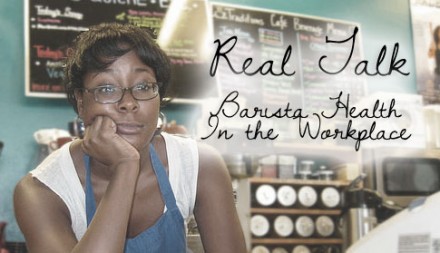
After months of interviews, public polling, private polling, and data collection, Sprudge.com staff writer Alex Bernson presents to you a landmark comprehensive overview of the health risks involved with professional coffee service. This is part one of a three part series.
Working in specialty coffee can be a rewarding, creatively stimulating experience. For some it’s a calling, for others a means to an end – paying the rent, recording your soon-to-be-hit album – but every last barista can tell you about the long hours standing, the highly repetitive physical tasks, and the stress of customer and management demands. For baristas working in high volume and quality-focused environments, there is an additional risk: the endless cups of coffee consumed in the name of “dialing in”, and the self-sampling quality control necessary in the pursuit of high quality coffee service. Over years and years of repetition, these workplace requirements cannot help but affect the physical and mental well-being of those required to perform them, often in negative ways.
The specialty coffee industry is growing; it’s never been more exciting, or more delicious, to be a coffee enthusiast or career coffee professional. But if the industry as a whole wants to continue its growth, thereby providing creating more and more coffee professionals, it’s my opinion (and the opinion of this website) that open dialogue needs to occur with regards to the challenges and risks that come from making high quality coffee on a daily basis. By fostering dialogue and conducting research, its our hope that we can reach some conclusions together, and help to create a professional environment across the industry that rewards honest evaluation. It’s okay to talk about this stuff; workplace health concerns are a real thing, and it’s time for this industry to address them thoughtfully and thoroughly.
This is the first article of a three part series based on a survey of coffee workers, interviews, and in-depth research. This series begins below with a discussion of the survey results; the series will continue by looking in detail at the known physical and mental hazards that people can face while making coffee. I’ll also be addressing some of the potentially unknown or under-considered health effects and potential solutions.
Our only request is that you pursue these articles and consider this research with an open mind. Professional coffee service is challenging and rewarding, but it may also carry with it some very real health side effects. It’s time for us to look at this information together and start a dialogue. It’s time for some real talk.
Talking about the health effects of working in coffee is totally okay.
Can we please acknowledge that working in specialty coffee brings with it a physical and emotional toll? I know I’ve felt it, and many of you have too. It doesn’t make you any less professional to recognize this fact; it doesn’t mean you aren’t worth scheduling for an open shift, and it doesn’t mean you’re better off behind the register in perpetuity. It’s a real thing, and it doesn’t make you weak or unworthy or any less of a capable team member. So why does there seem to be hesitance when it comes to actually talking health? And why is there so little public research available on this topic? We literally had to do our own polling to write this article, so let’s start there.
I freely admit that the survey conducted is meant to be purely informational, and in no way scientifically conclusive, but I assure that I have used the very best practices available in conducting and reporting on this information. My hope is that these articles serve as a starting point for more in-depth and rigorous investigations.
We surveyed a total of 475 coffee workers, using this set of survey questions, and wound up with some very revealing data. 47% of those surveyed had experienced upper body repetitive stress injuries that they attributed to their jobs. 20% had experienced heart palpitations or chest pains. And 62% believed believed their job or caffeine intake had caused emotional problems such as mood variability, depression or trouble interacting emotionally with others.
When asked directly in a separate question, less than half of the people who reported experiencing health affects felt that their job or caffeine intake had negatively affected their over-all health or well-being. I don’t know how to explain this seeming contradiction, but I do know that my job has negatively affected my well-being, and in the name of open dialogue I want to share some of those experiences with you.
For the past two years, I have been having serious and persistent pain in my right (tamping) shoulder. Six months ago I decided to start doing something about it and taught myself to tamp on my left side, and since I am blessed to be on my mother’s health insurance for another year, I eventually began physical therapy. Things are slowly getting better, and I’m glad that I admitted the problem and started talking about it.
About a month ago I was talking a co-worker at Sweetleaf, where I’m a working barista. She admitted she was doing the exact same therapy I was for the same issue. Hearing my co-worker admit to the same problems I had was encouraging—it made me feel not alone in my issues, and helped me to stop seeing the issues I was having as some sort of failure or lack of proper form as a barista.
After going through this, I started talking to other baristas I knew about health issues, and time and again I heard about issues I had no idea my coworkers and friends had been suffering through. I decided to conduct this survey of coffee workers to let people share their experiences, so that we can better understand and more productively talk about the issues we are all facing.
Here’s a look at some graphs from our research:
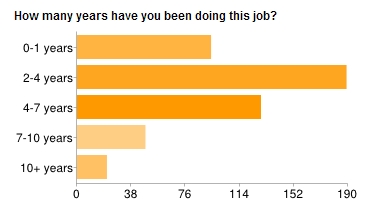
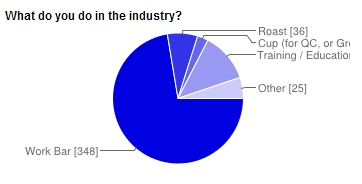
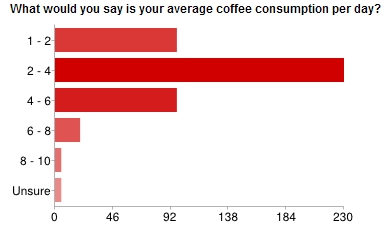
The makeup of survey respondents seems to agree with the sense most people have of this industry: it is still young, with most respondents having worked in this industry for 2-4 years; working bar is by far the most common occupation; and we all believe we consume 2-4 cups of coffee a day.
One perhaps unsurprising note about length of time in the industry: incidence of physical health issues increased linearly with amount of time spent in the industry, from 65% of people in the 0-1 year range, to 95% of people in the 10+ year range.


The percentage of negative health effects reported is high, but it seems that only a minority find those effects to be very serious. Negative health effects do not seem to overly discourage people from continuing to work in the industry, and despite many people reporting the job to be at times mentally or physically draining, overall the impact seems manageable. This could be a reflection of the “suffer for what you love” sentiment that cropped up a number of times in respondents’ comments; it may also be indicative of a wider problems surrounding open discourse in the specialty coffee industry.

What follows are direct quotes from responses in our survey:
“My general feeling about working in coffee is that it is not sustainable for most people to work four 8 hour bar shifts per week. I have been working in coffee for 15 years and I now have a permanently worn vertebrae in my neck from looking down all the time.”
“My doc said surgery for carpal tunnel is pointless. I essentially had to let my body heal, which meant that I had to quit being a barista. Now I sit behind a desk and I wish every day to be out with my customers, exploring the coffee world, and seeing farms! But those jobs are so hard to find without being forced to deal with torn ligaments.”
“I had intense an incessant pain in my portafilter hand for about a month. After considering the micro-movements involved in pulling a shot, I altered the angle of inclination of my hand while removing and replacing the portafilter. The pain went away.”

80% of respondents reported experiencing some sort of physical health effects from their job or caffeine intake. Some of these effects, such as upper body repetitive strain injuries, are fairly well understood—40% of respondents said that their training involved discussion of ergonomics.
The issues that are less understood, and potentially more worrisome, are things like heart palpitations, chest pains and digestion issues. I’ll be discussing my own experiences with heart palpitations when we examine high caffeine intake more closely in the final article of this series, but the question of digestion issues seemed very much on respondents’ minds in their comments, with many people worrying about the negative effects of the what can be the nutrient-light, pastry-heavy diet of bar shifts.
Particularly worrisome to me were reports of obscure digestion issues such as pernicious anemia and various types of food sensitivity. My unscientific impression is that a disproportionately high number of people in this industry suffer from digestion and toxicity problems—though perhaps the generally more food-aware nature of the business simply means that more people are noticing when they have these sorts of issues.

Another quote from the survey:
“After several years drinking coffee and working in the industry, last May I started having severe anxiety attacks which I am now certain are triggered by my caffeine intake. They haven’t been minor attacks, but have brought me to the ER on two occasions and have severely disrupted my life. I tried to get help from a Dr. but they only told me to stop consuming so much caffeine and to take a vitamin D pill. The former has helped actually–just monitoring it more, that is. I used to drink multiple cups a day and enjoy the buzz, but now I can’t do that. I get scared if I even drink more than one eight ounce cup of coffee. And it’s troubling because I am supposed to be tasting coffee throughout the day at my job…“
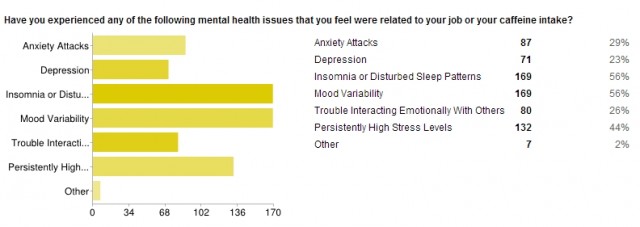
Mental health effects and their causes are harder to quantify than physical effects, and it’s been pointed out to me that “depression, mood variability and trouble interacting emotionally with others” could be a general description of the Millenial generation (just look at the mumblecore movies we make). Nevertheless, 66% of people have self-reported some sort of mental health effects from their job or caffeine intake.
Issues such as mood variability and insomnia are probably more tied to the high caffeine intake than to the job itself. I think most people have experienced the highs and lows of over-caffeination—I know that for me endless espresso shots have certainly contributed to mild anxiety attacks and inordinately crabby moods that can make it hard to interact emotionally with other people.
One very common theme in respondents’ comments was how erratic and poor management contributes unnecessarily to the stress of the job, both for baristas and people higher up the food chain. A number of respondents commented that the owners of their shops had made decisions for “aesthetic” or “philosophical” reasons that they knew negatively affected the well-being of their staff.

Quotes from responders:
“I put a ‘3’ for alcohol use as I would typically get a drink on my way home if I worked past 3pm; however, it was more to ‘unwind at a bar’ than to get alcohol in my system, so this number may be misleading.“
“I don’t drink or smoke weed to combat the effects of my caffeine intake per say, but rather to help me get sleepy so I can wake up early. Though I may be tired doing those things bring me over the edge and right to bed.”
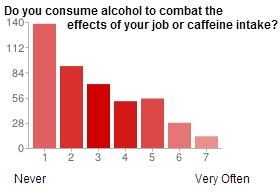

67% percent of respondents said that they at least occasionally drank alcohol to combat the effects of their job. Surprisingly, despite my impression that coffee people smoke tobacco heavily, only 23% of respondents said they smoke cigarettes (about in-line with the national average). 30% of respondents said they sometimes consumed marijuana or other drugs to combat the effects of their job, which based on gatherings of baristas, struck me as a little low, but my perception may be skewed by the fact I’ve worked professionally in New York City, Seattle, and Portland, where marijuana consumption is likely higher than the national average.
These numbers would probably be pretty similar for any other high-stress job, but it is important to consider the effects of people self-medicating, especially in light of the lack of health benefits in our industry.

“I once went to work the day after I broke my shoulder in a bike crash. I did not seek treatment for lack of insurance/fear of medical debt. I tamped with my left.”
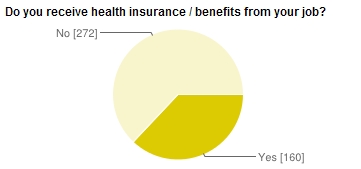
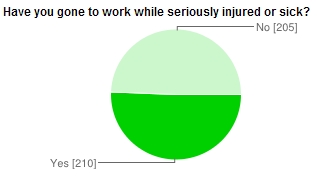
Out of all the health issues that can come from working in this industry, the most serious is probably the lack of access to health care, due to low wages and only 35% of people receiving health benefits from their job. A related issue is the difficulty of taking time off when sick, with over half of respondents saying they have gone to work while seriously injured or sick. This can either be because of the need for hours or an inability to find coverage.
Without access to proper health care, what would otherwise be manageable health effects from this job can have serious and long term health consequences. This is not a call for unionization or the enforcement of nationalized health care; it’s simply a reflection of facts in our research, and an open call for dialogue around the issue.
Join us again in the next few days as we take a deeper look at questions of barista ergonomics, the mental strains of customer service, and some new developments in the industry that may improve these issues.
The comments field below is open. Let’s have a dialogue.
Sourced from Sprudge.com




















 Image: Flickr (
Image: Flickr ( Image: Flickr (
Image: Flickr (

















Recent Comments